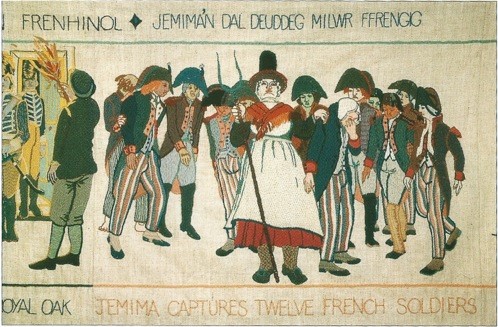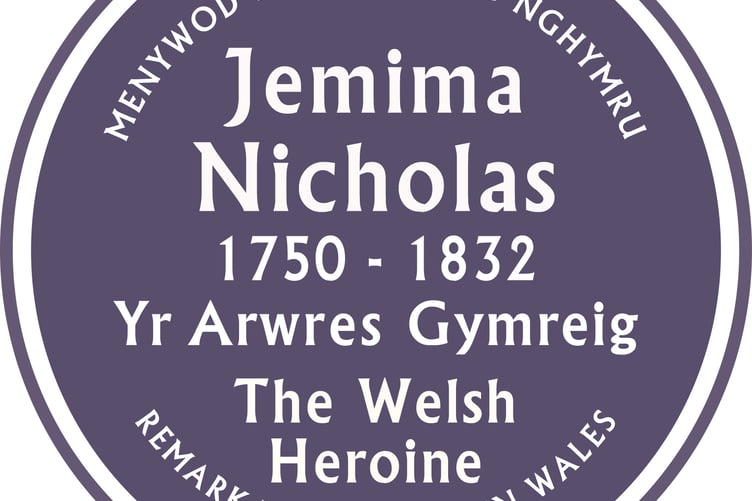WALES’ 15th Purple Plaque is being unveiled today to honour the woman who faced down the challenge of an invasion by 1,200 French troops in February 1797 - the last invasion of British soil by an enemy force anywhere in the United Kingdom.
While local militia and volunteer troops awaited reinforcements from Milford Haven and Haverfordwest, 47-year-old cobbler Jemima Nicholas led a band of women into the fray on Strumble Head near Fishguard and rounded up a dozen French revolutionary troops armed only with a pitchfork and her sheer courage.

The plaque was being unveiled at Fishguard Town Hall at lunchtime today.
Others to have previously been honoured include American war correspondent and writer Martha Gellhorn, the second wife of Ernest Hemingway, who made her home in Monmouthshire, at Kilgwrrwg near Devauden.
The story of Jemima Nicholas has become so-well known in parts of Wales that she is often simply referred to as ‘Jemima’, and is seen as something of a local legend.
But her story is based in truth, explains Professor Tony Davies, trustee of the Fishguard Invasion Centre Trust Ltd which was formed to celebrate the bi-centenary of the failed French invasion.
The Cardiff University emeritus professor said: “Four ships anchored off Carreg Wastad point on Strumble Head and discharged 17 boat-loads of troops, 47 barrels of gunpowder, 50 tons of grenades and arms for the 1,200 who came ashore at night.
“They were not a well-disciplined fighting force but they went around ransacking farms and we know that afterwards there were 42 successful claims for compensation from the British government as a result.”
Into the breach stepped Jemima and her group of women who walked towards the danger on February 22, 1797.
“She marched up to the headland with nothing but pitchforks when there were more than a thousand troops in the area. She showed great leadership and great courage to be able to round up 12 French troops and escort them back as prisoners to be held in Fishguard,” said Professor Davies.
A few days later the invasion faltered and the French surrender document was signed on Goodwick beach on February 24th.
The King, George III, commended the British commander in the area, Lord Cawdor, but Jemima’s exploits did not go unnoticed.
She was later awarded a £5 annual pension for life by the British Government, as a recently-discovered document shows, says Professor Davies.
“The Government must have been impressed with her to provide her with a pension for life - she lived until she was 82 - and I think she should be recognised now as one of the truly remarkable women of that century.”
The Purple Plaques scheme was the brainchild of Senedd Members Julie Morgan and Jane Hutt in 2017 and it aims to mark the often-unsung achievements of women of Wales and to help tell their inspiring stories to the next generation.
Local chanteuse Gwenno Dafydd, who was brought up in Pencaer where the French landed, was due to sing a song she co-wrote with her mother about Jemima’s deeds at the unveiling ceremony.
She said, “Growing up here Jemima was a role model for me - she was obviously a fiery, feisty West Walian woman. I feel that women need to have recognition for their deeds and she is the epitome of a positive role model for us even so long after the event.”
The Welsh Government Minister for Social Justice and Chief Whip, Jane Hutt, who will be attending the unveiling ceremony, said: “The Welsh Government Minister for Social Justice and Chief Whip, Jane Hutt, who will be attending the unveiling ceremony, said: “Jemima Nicholas showed incredible bravery and courage when faced by an invasion of 1,200 French troops in Fishguard.
“She was a remarkable woman and should serve as an inspiration to us all. This Purple Plaque is a fitting tribute to her legacy and raising awareness of her story, so we never forget her heroic actions.”
Former Member of the Senedd, Sue Essex, who chairs Purple Plaques Wales said: “Jemima was a truly remarkable woman for her time and it is great that she is now being remembered with one of our special purple plaques.
“She had no public honour in her lifetime, as far as we know, and she now joins the ranks of the 14 other remarkable women of Wales who we’ve honoured with our campaign to date.”





Comments
This article has no comments yet. Be the first to leave a comment.